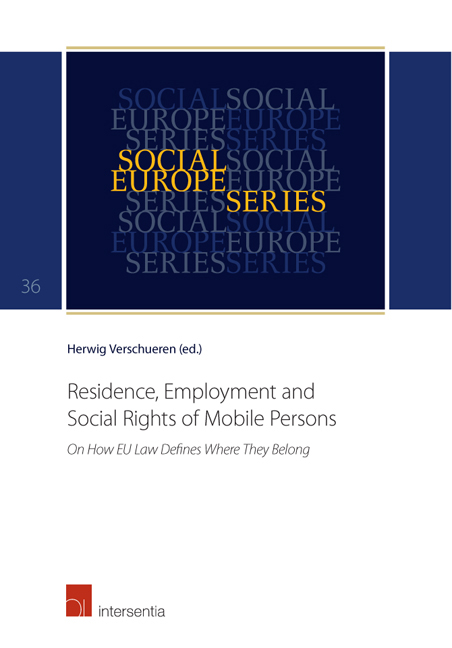Book contents
- Frontmatter
- Preface
- Contents
- List of Abbreviations
- List of Contributors
- Chapter 1 How EU Law Defines where Mobile Persons Belong. An Introduction
- Chapter 2 Family as Link. Explaining the Judicial Change of Direction on Residence Rights of Family Members from Third States
- Chapter 3 The Direction of the Court's Family Reunification Case-Law. A Plea for (Timely) Moderation
- Chapter 4 Sufficient Resources and Residence Rights under Directive 2004/38
- Chapter 5 Free Movement of Persons and European Solidarity. A Melancholic Eulogy
- Chapter 6 Once a Foreigner, Always a Foreigner. Who Does Not Belong Here Anymore? Expulsion Measures
- Chapter 7 Who Does Not Belong Here Anymore? A Statistical Snapshot of Member States’ Practices
- Chapter 8 Civic Integration Exams in EU Immigration Law. What Integration is Not in European Law
- Chapter 9 I Study Here, and Thus I Belong? Mobile Students in the European Union
- Chapter 10 Being Economically Active: How It Still Matters
- Chapter 11 Where Do EU Mobile Workers Belong, According to Rome I and the (E)PWD?
- Chapter 12 Conflicting Rules of Conflict: Social Security and Labour Law
- Chapter 13 Conflicting Rules of Conflict: Social Security and Labour Law. A Response
- Chapter 14 Where Does the UK Belong?
Chapter 1 - How EU Law Defines where Mobile Persons Belong. An Introduction
Published online by Cambridge University Press: 22 September 2018
- Frontmatter
- Preface
- Contents
- List of Abbreviations
- List of Contributors
- Chapter 1 How EU Law Defines where Mobile Persons Belong. An Introduction
- Chapter 2 Family as Link. Explaining the Judicial Change of Direction on Residence Rights of Family Members from Third States
- Chapter 3 The Direction of the Court's Family Reunification Case-Law. A Plea for (Timely) Moderation
- Chapter 4 Sufficient Resources and Residence Rights under Directive 2004/38
- Chapter 5 Free Movement of Persons and European Solidarity. A Melancholic Eulogy
- Chapter 6 Once a Foreigner, Always a Foreigner. Who Does Not Belong Here Anymore? Expulsion Measures
- Chapter 7 Who Does Not Belong Here Anymore? A Statistical Snapshot of Member States’ Practices
- Chapter 8 Civic Integration Exams in EU Immigration Law. What Integration is Not in European Law
- Chapter 9 I Study Here, and Thus I Belong? Mobile Students in the European Union
- Chapter 10 Being Economically Active: How It Still Matters
- Chapter 11 Where Do EU Mobile Workers Belong, According to Rome I and the (E)PWD?
- Chapter 12 Conflicting Rules of Conflict: Social Security and Labour Law
- Chapter 13 Conflicting Rules of Conflict: Social Security and Labour Law. A Response
- Chapter 14 Where Does the UK Belong?
Summary
More than ever individuals cross borders for work, business, studies, tourism, in search of international protection, for family or other reasons. By doing so they establish links with other countries, which could be the basis for legal claims against these States or for the application of their legal order. This book discusses the issue of these links and, more specifically, the question as to how EU law defines the link needed to obtain the right to reside in a Member State and the right to social and employment protection in that State. When it comes to claiming rights from States, traditionally ‘nationality’ is the answer to the question where a person belongs. However, in the context of European integration and the development of an EU legal framework of internal market rules, citizenship rights and immigration rules, different answers to these questions have been developed.
It follows from the analyses in this book that EU law gives a multitude of answers to the question which link is necessary and sufficient to create an individual's right vis-à-vis a State. The definition of this link, the criteria used and the legal consequences differ according to the legal framework the individual finds himself/herself in and the legal instrument he/she invokes. It also appears that the various applicable instruments of EU law all have their own criteria to determine with which Member State a person has a sufficient link to claim rights.
As regards the right of residence for Union citizens and the members of their family, Directive 2004/38 establishes the right of residence on the basis of, inter alia, the following criteria: do the persons concerned exercise an economic activity or not, what is the duration of their residence, do these persons constitute a burden on the social assistance system of the host State and is this burden ‘reasonable’, which family ties are accepted to create rights for members of the family as well, including third-country nationals? The establishment of the right to reside on the basis of these criteria also triggers the right to equal treatment with the nationals of the host State, for instance with regard to social benefits.
- Type
- Chapter
- Information
- Residence, Employment and Social Rights of Mobile PersonsOn How EU Law Defines Where They Belong, pp. 1 - 10Publisher: IntersentiaPrint publication year: 2016

